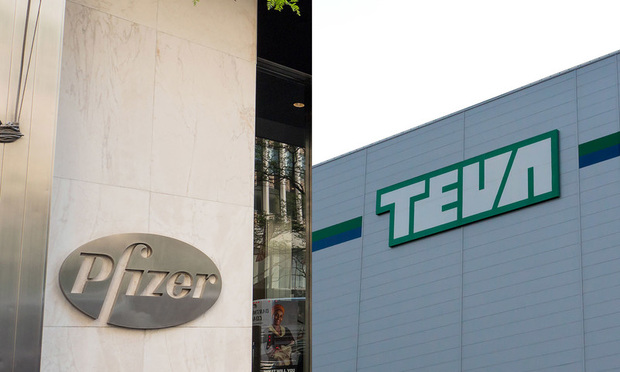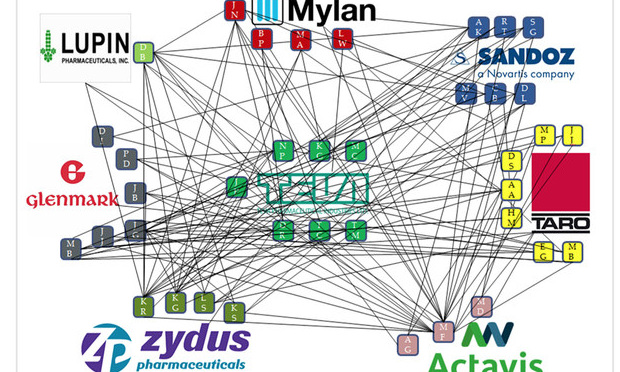 The drug companies had fought toprevent details of the lawsuit from becoming public, buta federal judge granted the states' motion to unseal thecomplaint. (Photo: Shutterstock.com)
The drug companies had fought toprevent details of the lawsuit from becoming public, buta federal judge granted the states' motion to unseal thecomplaint. (Photo: Shutterstock.com)
A newly unredacted antitrust lawsuit against individual defendantsand 20 corporate makers of generic drugs reveals details of how thepharmaceutical companies allegedly conspired to fix prices on morethan 100 medications.
|The companies describe their practices using such terms as “fairshare” or “playing nice in the sandbox.”
|But attorneys general from across the country allege asystematic conspiracy involving thousands of emails and phone callsto stifle competition and cause prices on generic antidepressantsand other drugs to sometimes rise 1,000 fold.
|Related: Drugmakers accused of generic-drug price fixing innew antitrust lawsuit
|Attorneys general from 44 states, including Connecticut,Delaware, Florida, New York, New Jersey and Pennsylvania, filedsuit against Teva Pharmaceuticals USA Inc., Pfizer Inc.,Sandoz Inc., Mylan Pharmaceuticals Inc., and other defendants inMay. But the details of those allegations weren't made public untilthis week, when the Office of the Connecticut Attorney Generalreleased an unredacted version of the 524-page lawsuit.
|The drug companies had fought to prevent details of the lawsuitfrom becoming public, but a federal judge grantedthe states' motion to unseal the complaint.
|Here are some of the key takeaways.
|Lawyers allegedly helped fend off congressional inquiries
The lawsuit shows, for example, that in early October 2014,Heritage Pharmaceuticals received a letter from U.S. Rep. ElijahCummings and U.S. Sen. Bernie Sanders as part of aninquiry into generic drug pricing.
|“Heritage's outside counsel immediately set out to coordinate aresponse with counsel for defendants Teva and Mylan, to providewhat he referred to as 'polite f-u' letters to Congress,” thelawsuit stated.
|The attorneys general include in their complaint an allegedemail to Heritage's Chief Executive Officer Jeff Glazer from anunidentified lawyer serving as the company's outsidecounsel.
|That email allegedly informed the CEO his attorneys were workingwith lawyers from Teva and Mylan to schedule a conference call toensure the companies were “all on the same page.”
|“The consensus is, at this point, that the response will bepolite f-u letters,” according to the email cited on page 356 ofthe lawsuit.
|No one from Teva or Mylan's media relations offices responded toa request for comment.
|But Denise Bradley, a spokeswoman for Heritage, denied anywrongdoing.
|“Heritage has no visibility into how other companies respondedto the congressional inquiry, but I can tell you that Heritagefully responded to the inquiry received from Sen. Sanders and Rep.Cummings, multiple times, by providing substantive and confidentialinformation about its product sales and pricing data in order toassist and better inform the investigation,” Bradleysaid.
|Girls' nights out and other social events
The lawsuit also notes that top officials from competingcompanies regularly spent time together at events such as golfoutings, “girls' night out,” conferences, trade shows and industrydinners that companies would take turns sponsoring.
|It alleges the companies cultivated close ties, shownin emails, top drug company executives called competitors“fraternity brothers” and declared love for each other.
|But the attorneys general allege a sinister goal.
| This chart shows the extent of communicationamong drug companies related to allegedprice-fixing, according to an antitrust lawsuit byattorneys general in 44 states.
This chart shows the extent of communicationamong drug companies related to allegedprice-fixing, according to an antitrust lawsuit byattorneys general in 44 states.
“These trade shows and customer conferences provide generic drugmanufacturers, including but not limited to the defendants, withample opportunity to meet, discuss, devise and implement a host ofanti-competitive schemes,” the suit claims.
|Mike Cole, chief of the antitrust and government frauddepartment at the Connecticut Attorney General's Office, said whileit's not technically illegal for competitors to gather at suchfunctions, he's confident those functions were more than justfriendly events.
|“These multiple outings provided an opportunity to collude,”Cole said. “When you are at the bar or the first tee with acompetitor, it stands to reason that there is an incentive to startto talk about business. One thing leads to another and, over time,these outings provided opportunities to discuss business and, morespecifically, customers and pricing for specific drugs.”
|Cole said he is convinced top drug company officials knew whatthey were allegedly doing was wrong.
|“The first thing you are taught in antitrust training is to notdiscuss future and current pricing and customers with yourcompetitors,” he said. “They knew it was wrong.”
|Drug company officials describe their interactions asprofessional encounters to foster legitimate and reasonablebusiness ties.
|But Cole disagreed.
|“It's about not undercutting another competitor when they raiseprices, and to not try to steal another competitor's customers,” hecountered.
|Fair share
Top company officials often referred to “fair share,” a termwidely used in the industry to allegedly describe an agreementamong the largest companies, to divide the generic drug marketamong themselves, rather than allowing market forces to do so. Inthis way, they stifled competition and caused prices to rise,rather than drop, according to attorneys general.
|“Once a manufacturer has achieved its fair share, it isgenerally understood that the new competitor will no longer competefor additional business,” according to the complaint. “The commongoal or purpose of this overarching agreement is to keep priceshigh, avoid price erosion and serve as the basis for furthersupra-competitive price increases.”
|The defendants deny any wrongdoing.
|Teva, Pfizer, Sandoz and Mylan are the four largest makers ofgeneric drugs listed as defendants.
|“As the company stated when the states' initial complaint wasfiled on May 10, we have cooperated with the Connecticut AttorneyGeneral since [Pfizer subsidiary] Greenstone was contacted over ayear ago,” Pfizer spokeswoman Sally Beattysaid. ”After carefully reviewing the complaint, thecompany stands by its initial conclusion that neither we nor ourcolleagues participated in unlawful conduct.”
|Sandoz also denied wrongdoing and re-issued the same statementit had in May.
|“We believe that these claims are without merit and willvigorously contest them,” it said.
|Leslie Pott, Sandoz's communications vice president, declined tocomment Tuesday on any of the specific allegations outlined in thenewly unredacted lawsuit.
|Connecticut Attorney General William Tong spearheaded the suitby 44 states, excluding California,Texas, Georgia, South Dakota, Arkansas and Wyoming.
|“The evidence is undeniable and the conspiracy isunconscionable,” he said. “Our lawsuit alleges that generic drugmanufacturers engaged in a brazen, industrywide conspiracy to fixprices and allocate market share for drugs that we rely on everyday.”
|Read more:
Complete your profile to continue reading and get FREE access to BenefitsPRO, part of your ALM digital membership.
Your access to unlimited BenefitsPRO content isn’t changing.
Once you are an ALM digital member, you’ll receive:
- Critical BenefitsPRO information including cutting edge post-reform success strategies, access to educational webcasts and videos, resources from industry leaders, and informative Newsletters.
- Exclusive discounts on ALM, BenefitsPRO magazine and BenefitsPRO.com events
- Access to other award-winning ALM websites including ThinkAdvisor.com and Law.com
Already have an account? Sign In
© 2024 ALM Global, LLC, All Rights Reserved. Request academic re-use from www.copyright.com. All other uses, submit a request to [email protected]. For more information visit Asset & Logo Licensing.








